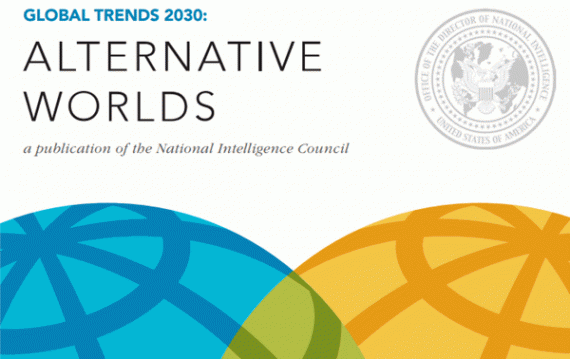Global Trends 2030
The National Intelligence Council has released its quadrennial strategic forecast, Global Trends 2030: Alternative Worlds.
The National Intelligence Council has released its quadrennial strategic forecast, Global Trends 2030: Alternative Worlds. The Atlantic Council has also published a companion report, Envisioning 2030: US Strategy for a Post-Western World, which provides recommendations for the United States government to navigate new realities ahead and calls upon renewed American leadership to successfully tackle new global challenges.
Aside from helping edit the latter, I’m also blogging and tweeting on both reports over the next few days. My posts thus far:
Global Power 2030
Today’s Global Trends 2030 report by the National Intelligence Council predicts that, “By 2030, no country—whether the US, China, or any other large country—will be a hegemonic power.” Considering that this has already been true for quite some time, it’s a safe bet.
[…]
There are very good reasons to doubt that China or India will emerge as great global powers. Indeed, as the Atlantic Council’s Robert Manning puts it in his companion report, Envisioning 2030: US Strategy for a Post-Western World, “[T]he United States remains disproportionately the leading steward of the current global system. On most occasions when the world dials 9-1-1, it is the United States on the other end.”
The reasons for this are manifold but perhaps chief among them is that the United States has long wielded a substantial amount of what Harvard’s Joe Nye termed “soft power,” the ability to persuade others to follow through attraction rather than coercion. For Nye, this exists when “other countries—admiring its values, emulating its example, aspiring to its level of prosperity and openness—want to follow it. “
Shaping 2030 Today
The Global Trends 2030 report offers four starkly different alternative world systems a generation hence. US policy decisions in the next four years will greatly influence which of these comes to pass.
[…]
As principal author Robert Manning rightly puts it, “it will be human agency-how key actors, and most importantly the United States-adapt and respond to dynamic global trends that will determine whether we can avoid the worst and achieve the best.”
The report looks at several specific policy issues, some of which will be the subject of future posts in this series. But the overarching challenge is “how to preserve the successful operating principles of the international system” that has brought so much global advancement over the last seven decades “while revising the status quo to reflect new economic and political realities, new concerns about the efficacy of the system, new actors with divergent views, and new global pressures.”
[…]
It’s hard to have much confidence that a governing body that may well be about to drive over a “fiscal cliff” of its own making will muster the discipline to make hard choices that won’t pay off for decades. But the alternative is a future that’s much more bleak.






Is there anything non-obvious in the NIC report, James? That, at least to me, has been its historic weakness.
Example: predicting that China’s economy will be larger than that of the U. S. is an exercise in the persistence theory. A fairly safe but not precisely bold prediction. Predicting that China will fragment or decrease from its present level of strength would be bold and non-obvious.
2030 is an interesting date. It so happens that the latest CBO forecast is that Social Security will be insolvent in 2033. And that’s based upon macro growth, job growth and inflation rates consistent with historical norms. IOW it’ll be a lot sooner than 2033 that the “Third Rail” will go bust. That’ll leave a mark.
In any event, here are some related items to postulate:
– China’s navy and air force against ours would be like the JV squad at the local high school going up against the Patriots. But what do you suppose would happen to our economy if they short sold their Treasury holdings in massive volumes, using leveraged puts?
Sometimes power purely can be financial. And owing people money can be a real bitch.
– Since prosperity is the carrot that allows us to have so much influence in the world, what will the effect over the next two decades be of continued massive budget deficits, sustained unemployment and underemployment on massive scales, a debt-to-GDP ratio in excess of 100% of GDP, and macro growth far below historical norms? Taxes and regulations after all have real world consequences, not to mention papering over bad debts, bailing out with public money poor stewards of private capital, along with printing money like it’s going out of style.
Europe West is the answer, right? Unless we’d be willing to kick some ass for the sake of kicking ass. And if the military gets drawn down and the public goes full Cindy Sheehan will we even have that capability?
This won’t end well.
@Dave Schuler: No and Yes. I’m not privy to the classified version of the report and if I were I wouldn’t be at liberty to share it. But the public report is basically informed conventional wisdom. They’re also constrained from boldness both because they’re a bureaucratic entity and because they’re a US Government entity. The former promotes blandness and the latter promotes being non-threatening.
I hope I’m not treading on your toes in saying this but I think the reports, at least the basic ones, should be abandoned. Reports of this sort, a distillation of the prevailing wisdom, were useful perhaps 20 years ago. In a world with the Internet and search engines they’re superfluous. Anybody who’s interested can get the like with a bit of Googling or Binging. Indeed, I wonder if open source intelligence wouldn’t provide most of what’s in the classified version.
It’s virtually a perfect example of bureaucracy at work. Starting production just as they’ve become unnecessary.
We need all of the insight we can get but compilations of the prevailing wisdom is just what the Internet is good for.
@James Joyner:
Interesting comment JJ. I must say I’ve read a couple of summaries of this report in the media and it all seemed to me to be stating the obvious. It also seems to have overtones of encouraging US complacency a bit like those reports that used to circulate in Britain in the early 1900’s in response to Mackinder and others. This for example is preposterous certainly as it relates to China which has already emerged as a great global power (in real terms I’d say as of right now its real relative power quotient is at least equal to say the Soviet Union in 1980).
There are very good reasons to doubt that China or India will emerge as great global powers.
Obviously India is further away but if one accepts one of the central tenets of the report (a huge increase in the second/third world middle class) then India has to be a prime beneficiary of this. Personally I’ve little doubt that in 50 years time India is going to be one of the four or five major powers in the world. None of this implies a US eclipse but a move into a multi polar world where our counterparts are going much more genuinely powerful than was the Soviet Union which was a lot of hat and not much cattle.
@Tsar Nicholas:
That’s funny, what makes you think the Chinese are prone to suicidal tendencies? I certainly haven’t seen anything to lead me to think that.
In other words, what do you suppose would happen to their economy if they short sold their Treasury holdings in massive volumes, using leveraged puts?
@Tsar Nicholas:
But what do you suppose would happen to our economy if they short sold their Treasury holdings in massive volumes, using leveraged puts?
So the world’s greatest exporter is going to sabotage the world economy and thus destroy demand for its products……Yep that makes entire sense Nicko
@OzarkHillbilly: @Brummagem Joe: He’s been reading too much Tom Clancy methinks.
@Timothy Watson:
He’s been reading too much Tom Clancy methinks.
I don’t think so, there aren’t any pictures to color in the Clancy books.